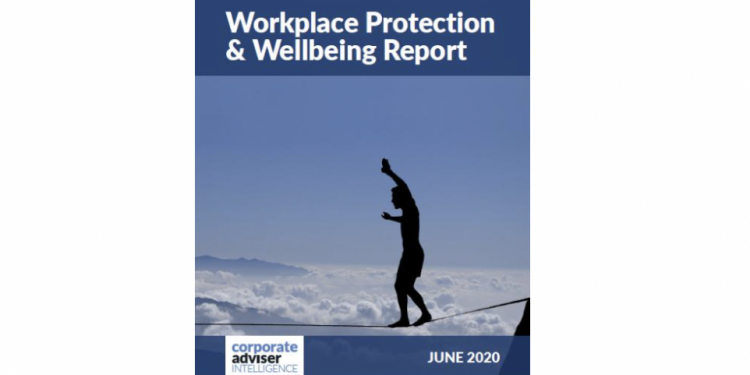The 2020 Workplace Wellbeing & Protection Report published by Corporate Adviser Insight has shown the group risk and healthcare market was in a very strong position ahead of the widespread economic disruption caused by the Covid-19 pandemic.
Discussing the report at a recent virtual roundtable, employee benefit consultants and providers reflected on how well placed the industry was to cope with the health and economic challenges presented by Covid-19.
Daniel Toms, TowergateHowden Employee Benefits & Wellbeing senior risk consultant Paul White said the report underlines how strong this sector has been in recent years, although he adds it faces challenges in 2020.
“Covid is the most immediate challenge, but there may also be Brexit headwinds towards the end of the year. But we are facing this from a position of strength, with the market having enjoyed steady growth in recent years, regardless of external circumstances.
“This meant we have been in a good position to respond to the needs of customers as the Covid crisis hit,” he said.
As White pointed out, the report shows that there has been growth across the risk market: with group income protection seeing the highest levels of growth in the sector during 2019, in terms of both the number of employees covered and the number of employers offering these schemes to their staff. There has been a 7 per cent increase in the number of employees covered by GIP schemes, and a 2 per cent increase in the number of employers offering this benefitt. That said, all advisers agree that too few employers are buying this benefit.
Premier Benefit Solutions head of risk and healthcare Allyson Gayle described these GIP figures as “a really encouraging finding”. Many consultants and advisers have long championed the benefits of group income protection, so have been pleased to see strong growth in this market — although many fear this trend may be disrupted by Covid.
Canada Life strategic propositions director Paul Avis pointed out that one of the key benefits of a GIP policy is it offers some financial protection, and support for mental health issues. He said that this can make this product particularly attractive to workforces with who have higher numbers of younger employees, as unlike many physical conditions – such as cancer or heart disease – mental health problems more equally effect those across all age groups, and claims aren’t skewed towards older employees.
Furthermore, the mental health impact of Covid-19 on people will likely lead to higher mental health claims for GIP in 2021 he said, especially when aligned with the financial difficulties many people are facing.
As the Covid crisis has taken hold this year, this support for mental health has been particularly valued by clients, according to advisers attending the roundtable – and most agreed mental health will be one of the key employee benefit concerns going forward.
The report also highlighted the strong growth in the group life market: with the number of employers offering this benefit to staff increasing by 11 per cent in 2019. Avis pointed out that this growth has been partly driven by the exponential growth in excepted schemes.
From a provider’s point of view, the current focus remains on paying an increasing number of death claims, due to higher mortality figures, although Avis said there may be a renewed focus on critical illness insurance, as an upturn of cancer and heart disease cases is expected over the next year, partly due to delayed screening and detection as well as postponed treatments and fear of going to hospital.
Towergate Health & Protection group risk consultant Daniel Toms says the current crisis has meant there is an increased awareness of the value of life insurance, and related benefits.
“We’ve definitely seen a significant number of clients want to look again at the design of their employee benefits, and perhaps open out this benefit in particular to all employees, rather than just a select number.
“The short term impact is likely to be more employers looking to provide this benefit for staff, although they may not have much in the way of surplus funds to play with. We have found though that many new clients are pleasantly surprised how affordable it is to provide this core benefit.”
White adds that the way group risk providers have responded to this crisis has helped to enhance the reputation of the industry. “They have paid life insurance claims, promptly and efficiently and in many cases offered additional support services.”
He pointed out that this compares favourably, when you consider some of the issues that have beset the travel industry — where people have struggled to get refunds or insurance payouts for cancelled holidays — and the private healthcare market, where people have not been able to access many core benefits.
“Most employers now recognise the value of group risk insurance. Typically though group risk has not been valued by employees. It remains to be seen whether this changes at all as a result of this current crisis.”
Advo Group employee benefit manager Jamie Tuffield said the report contained interesting figures on the cash plan market. “While the number of employees covered by cashplans increased last year, I was surprised to see the number of employers offering corporate cash plans had fallen by 2.2 per cent. I wonder if this is partly due to the changes to PMI excesses?”
He said these figures contradict Advo’s own experience in this market, where they have seen more clients offering this as part of a comprehensive employee benefits package. “Given the breadth of benefits now available under a cash plan it will be interesting to see if this growth continues in a post-Covid market, and whether this may be an alternative option to a more expensive PMI plan.”
Elsewhere a number of advisers attending the round-table said the report highlighted trends within the industry, that were likely to accelerate as we move from a period of crisis to “the new normal”.
Alex Pickard, a director of Willis Towers Watson Health & Benefits said: “One of the key takeaways from this report is how priorities are shifting for employers, when it comes to benefits, and the increasing importance they place on wellbeing services.”
He says he wasn’t surprised to see that the report found that advisers rated wellbeing services as providing the highest return on investment to employers during the recent lockdown, where there has been an increased focus on both physical wellbeing and mental health.

Mercer Marsh Benefits head of health and wellbeing Elizabeth Turner added that the report also showed that the investment providers had made into digital services and delivery channels in recent years was certainly paying off, with an increased reliance on these during the lockdown.
Turner said: “Employers have continued to protect benefits, during this period, and this is partly due to the fact that employees have been able to use these digital support services during this period.”
Even as lockdown starts to be eased, she says it is clear that the ‘new normal’ is likely
to involve a far higher proportion of the working population working remotely from home. Digital communications and services must be an integral part of any health and protection proposition she said.
“We’ve seen some insurers make digital access a key part of their proposition.
It’s likely that this will be offered across the board, although conversely if everyone is offering this it may be valued less. However digital services remain a key way to engage employees and promote providers’ brands, that may not be as well known in the retail market.”
As lockdown starts to ease there will be new challenges for the sector, which through its various group risk products has always had a focus of helping people back into work.
What role can it play in helping a whole economy back onto its feet and into the office? It is clear that this industry is likely to be helping facilitate this transition, with a number of PMI and cashplan providers to offer Covid-antibody tests to clients.
This innovation was cautiously welcomed by the advisers present, although they said such testing regimes had to be part of an overall package of measures, that also focused on occupational health, physical changes to the workplace, increased social distancing and improved sanitation and cleaning of offices and other workplaces.
Turner said antibody and antigen testing aren’t a panacea for returning to a pre- Covid working environment. “Most businesses aren’t pushing for all their staff to return to an office environment. They are being paternal and cautious, as recent months have shown that many people can work from home effectively, so they are not rushing into change again.”
Many businesses are likely to change working practices for good, with far fewer people working full time in offices.
Toms said there remains a degree of uncertainty about how these tests work, whether a positive test implies immunity, or whether staff could be compromised if there is a second wave of Covid-19.
Tuffield added: “We have had a high number of enquiries about testing, but clients are generally not making decisions about this at present. There is a feeling they want to wait for more medical evidence.” As he points out it is not a case of simply testing those in the workforce once: these tests would potentially have to be repeated regularly for those testing negative.
Gayle added: “As an industry we do tend to be reactive, but this is one case where the industry has been proactive but clients are taking a careful approach and reacting as events develop and unfold.”





